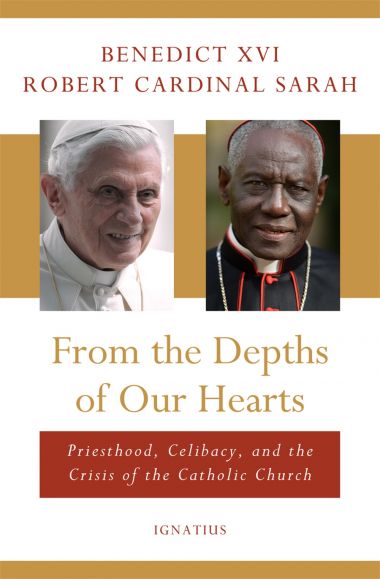From the Depths of Our Hearts: a not so controversial intervention on priestly celibacy?

From the Depths of Our Hearts: Priesthood, Celibacy and the Crisis of the Catholic Church was launched on 15 January in France, following a pre-publication statement suggesting that Pope Emeritus Benedict XVI had co-authored the book. The book's official author, Cardinal Robert Sarah, has been known to have Orthodox views, particularly on those surrounding celibacy and sexuality.
One chapter, which has been co-signed by both clerics in question, re-affirms the doctrine that priests and other clergy must make a vow to celibacy and to encourage this in their priestly brotherhood. This has been said to be a direct protest against events at the end of last year when Pope Francis hosted the controversial Synod of Bishops for the Pan-Amazon Region.
The practices and discussions of this Synod caused widespread debate and even an incident of vandalism. In the closing document, a proposal was made for married men who are already part of the diaconate clergy, and in a stable marriage, to be ordained as priests to relieve vast shortages in the area. As Pope Francis prepares his post-synodal Apostolic Exhortation (usually published around six months after a synod closes), the publicity surrounding Cardinal Sarah's statements is sure to create tensions.
The chapter of From the Depths of Our Hearts is clear in its opposition, with the writer stating, 'I cannot be silent!' Cardinal Sarah, in an interview with Le Figaro newspaper, has called it 'a cry for love for the Church' and the 'crisis' it is facing. This should not necessarily be a surprise to those already familiar with Cardinal Sarah's orthodox views and strong vocalisation of such. In this book and in his other work, Cardinal Sarah vouches for priestly celibacy being an absolutely necessary element of the vocation to the priesthood.
The chapter creates a detailed study of both the Old and New Testaments, with Pope Emeritus Benedict XVI stating that the Old Testament demonstrates that 'the relation between sexual abstinence and divine worship was absolutely clear' throughout Israel. The chapter goes on to justify that with the regular, and often daily, celebration of the Eucharist, there is a necessity to keep abstinence throughout a vocation to the modern priesthood. Cardinal Sarah then builds upon this with a set of concerns around modern pastoral practices, calling for a renewal of the 'spiritual reality of the sacrament of Holy Orders'.
Cardinal Sarah goes on to describe ordaining married men as a 'pastoral catastrophe' which also leaves the notion open to 'adaptation to customs and cultures' – precisely what he sees as the goal of the Amazonian Synod. This is not the first time that the issue of local adaptation has reared its head with regards to sacramental practices. Amoris Laetitia, Pope Francis' Apostolic Exhortation following the Synod on family life, caused controversy in 2016 when it was suggested that it advocated for divorced and re-married people to take communion under certain, local circumstances. While some groups have praised this encouragement of local engagement in local issues, others see this as an attack on universal doctrine.
Pope Emeritus Benedict XVI is perhaps not the doctrinal dictator made out in reviews of From the Depths of Our Hearts. In 2011, he established The Personal Ordinariate of Our Lady of Walsingham. This offered Anglicans, both individually and corporately, to be received into full Catholic communion, after discerning an agreement with Catholic principles. In the UK, three bishops, two with their wives, were received into the Church and later ordained to the Catholic priesthood.
Anglicanorum Coetibus, the Apostolic Constitution made as part of the establishment of the Ordinariate states that 'those who ministered as Anglican deacons, priests, or bishops, and who fulfil the requisites established by canon law... may be accepted by the Ordinary as candidates for Holy Orders'.
Perhaps more importantly in this case is for the ordination of married men, 'the norms established in the Encyclical Letter of Pope Paul VI Sacerdotalis Coelibatus are to be observed'.
Pope Emeritus Benedict XVI's association with this publication, whether it is, as Cardinal Sarah states, as a co-author, or as his aide suggests, as an advisory, provides reason to question Pope Benedict's vow to not interfere with the pontificate of Pope Francis.
This book in its own right is not controversial – it does not call into question any doctrinal principles or canonical disciplines. Rather, it is significant in its demonstration of a further and continued encampment of ideological standpoints. From the Depths of Our Hearts provides another step in the narrative of Pope Francis, the radical game-changer, and Pope Benedict the stalwart for doctrine.
Nina Mattiello Azadeh studied music and philosophy and was a Faith in Politics media intern in 2016. She has a keen interest in interfaith relations, social action and is a classical ballet dancer. Follow her on Twitter @Ninamataz











